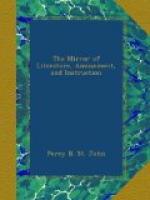Now that good youth one day came to his father, and said, “Father, I am well assured that you are not rich enough to support me according to what I conceive becoming and honourable. It will, therefore, be incumbent upon me to lead a mean and indolent life, or to quit the country; so that if it seem good unto you, I should prefer for the best to form some marriage alliance, by which I may be enabled to open myself a way to higher things.” And the father replied, that it would please him well if his son should be enabled to marry according to his wishes. He then said to his father, that if he thought he should be able to manage it, he should be happy to have the only daughter of that good man given him in marriage. Hearing this, the father was much surprised, and answered, that as he understood the matter, there was not a single man whom he knew, how poor soever he might be, who would consent to marry such a vixen. And his son replied, that he asked it as a particular favour that he would bring about this marriage, and so far insisted, that however strange he thought the request, his father gave his consent. In consequence, he went directly to seek the good man, with whom he was on the most friendly terms, and having acquainted him with all that had passed, begged that he would be pleased to bestow his daughter’s hand upon his son, who had courage enough to marry her. Now when the good man heard this proposal from the lips of his best friend, he said to him:—“Good God, my friend, if I were to do any such thing, I should serve you a very bad turn; for you possess an excellent son, and it would be a great piece of treachery on my part, if I were to consent to make him so unfortunate, and become accessory to his death. Nay I may say worse than death, for better would it be for him to be dead than to be married to my daughter! And you must not think that I say thus much to oppose your wishes; for as to that matter, I should be well pleased to give her to your son, or to any body’s son, who would be foolish enough to rid my house of her.” To this his friend replied, that he felt very sensibly the kind motives which led him to speak thus; and intreated that, as his son seemed so bent upon the match, he would be pleased to give the lady in marriage. He agreed, and accordingly the ceremony took place. The bride was brought to her husband’s house, and it being a custom with the Moors to give the betrothed a supper and to set out the feast for them, and then to take leave and return to visit them on the ensuing day, the ceremony was performed accordingly. However, the fathers and mothers, and all the relations of the bride and bridegroom went away with many misgivings, fearing that when they returned the ensuing day they should either find the young man dead, or in some very bad plight indeed.




